- Home
- T.A. Barron
Heartlight Page 2
Heartlight Read online
Page 2
Mrs. Donovan, who had a figure like an overstuffed shopping bag, took her out to the hallway. Shaking her head solemnly, she said: “Kate, Kate, Kate! You have no idea how hard I’ve tried to get you to show some interest in my science class! With no success at all, I’m afraid. At first I thought it was just a matter of time, but now—now I’ve given up. Don’t you share any of your grandfather’s interest in science?”
Kate didn’t respond. Answering such questions only made things worse.
“Really, Kate! How can someone with a family like yours be so lazy in school?”
She merely gazed at the floor.
Placing her hands on her nonexistent hips, Mrs. Donovan declared: “If you think having a famous grandfather allows you to daydream through my classes, I’ve got bad news for you.”
“I wasn’t daydreaming!” Kate objected. “I was thinking.”
Mrs. Donovan peered dubiously down at her. “Thinking about what?”
Kate hesitated. “I was thinking about sunspots—how they form, how they can even change our weather. I’m reading about them in one of Grandfather’s books.”
The teacher scowled, her several chins drooping in unison like a stack of frowns. “For someone who daydreams her way through school, you certainly do come up with some inventive excuses.”
“I wasn’t daydreaming!” protested Kate, her temper flaring like a solar prominence.
Grandfather never asked, nor did Kate explain, why she came home from school so early that day.
“Do you remember your grandmother, Kaitlyn?”
Grandfather’s question jolted her back to the present. “Yes, sort of. I mean, it was a long time ago that she died.”
“Not so long, really.” He glanced at the grape arbor. “She knew me, Kaitlyn. She knew that I much preferred the wild moors over any garden, that I missed the call of the curlew, the crumbling stone walls, the gorse growing wild that I knew as a child in Scotland. The moors are in my blood. If she’d left it up to me, this garden would look more like the Back of Beyond!” He laughed, remembering some distant moment. “But she taught me how to love a calmer place like this, as well as some of the wilder places within myself. Your grandmother could see further through a millstone than most.” He sighed. “The only thing she couldn’t teach me was how to accept the fact of death. That lesson has always been beyond my grasp, I’m afraid. She went so peacefully when her time came … while I’m certain I’ll battle it every step of the way.”
Kate thought about the large portrait of Grandmother as a young woman that hung in the hallway by the front door. Those deep brown eyes, the open face, the comfortable dignity of her posture, all made her seem so alive. And so lovely. There was also a slight touch of impatience at the corners of her mouth: It was clear she would much rather have been out working in the garden than sitting still for a formal portrait. Like Kate, she often wore her flowing blond hair in a braid, but unlike Kate’s slapdash knotting, it always looked effortlessly elegant. To have known such a person, and then to have lost her …
“She would have liked to have known you better,” he continued. “The two of you would have much in common.”
Kate flushed with doubt. “I don’t know. She was so wise and beautiful and everything.”
“You don’t think you’re wise?”
“Are you kidding? Just ask Mrs. Donovan! I’m at the bottom of my class.”
Grandfather shook his white mane. “Einstein was bored at school, too.”
“That’s different! He was a big brain! I’m more like a big dunce.”
“A dunce is one thing you’re most definitely not, my child. You have very special gifts. You have extraordinary insights. It’s only a matter of time before you discover how you want to use them. Try to be patient—”
“Patient! I’ve never been patient in my life!”
“I said try to be patient, Kaitlyn.” He extended a weathered hand to her. “This has been a hard year for you, hasn’t it?”
Kate nodded, and her round eyes began to fill with tears. “Sometimes I wish we’d never moved! I don’t have a single friend at school. Everybody’s always making my life miserable.”
He drew her near in a gentle hug. “You’re still my special friend, you know. You’re the same little girl I’ve always loved.”
“But I’m not!” she spouted, pushing away. “I’m not little! And I’m not the same! Nothing’s the same!” Her gaze fell to the ground. “Sometimes I feel like … like I don’t belong anywhere!”
“Kaitlyn,” said Grandfather quietly. “You still belong here.”
She looked at his eyes, sparkling in the same hazel-green hue as her own, and felt her tears welling to the surface. She buried her head in his familiar white lab coat.
For many minutes, Grandfather held her and said nothing. Gently he stroked her long braid, as the sound of her quiet sobbing filled the garden. Cumberland nestled his head between his paws.
In time, Kate lifted her face.
“Oh, Grandfather … this was supposed to be a fun picnic for you.”
“Who says this isn’t fun?” he answered with a twinkle. “I thought you were just working up an appetite for some lemon poundcake.”
Kate wiped her face on her sleeve. “Grandfather, I don’t know what I’d do without you.”
“You’d probably eat off clean dishes, like normal people.”
Kate grinned, already feeling a little better. “Somehow you always—oh! Look!”
She jumped to her feet, pointing to a tiny glittering form dancing on the fountain. “There! What an amazing butterfly!”
Grandfather, too, was on his feet. “Morpho nestira,” he said softly in wonderment. “So you are still alive.”
As the butterfly settled upon the stone fountain, it began slowly to open and close its delicate wings, rhythmically, like a beating heart. Each time the wings opened, they flashed with iridescent blue, green, and violet—colors more brilliant than Kate had ever seen. As the wings drew closer together, the colors evolved from the deepest hues into an opalescent luster. The undersides of the wings, by contrast, were a simple shade of brown, with only a subdued pearly sheen around the edges providing any hint of the colors inside. Then suddenly: The wings reopened in a burst of brilliance, radiating blues and greens of impossible purity.
“Those wings are like rainbows,” Kate whispered.
“Yes,” answered Grandfather, “but even better. No rainbow has colors so intense. Those wings are covered with millions of microscopic prisms that concentrate and purify the light.”
“What did you call it?”
“Morpho nestira. It comes from South America.”
“South America! How did it get up here?”
Grandfather watched the pulsing wings thoughtfully. “I brought it back with me, on my last trip to the Southern Observatory in June. It took me three expeditions into the Amazon to find one. At the rate the forests down there are being destroyed, the butterflies’ habitat is being wiped out and they may soon be extinct.”
“You wanted it for your collection?”
“No. Not this butterfly.”
“Then why did you bring it back here?”
“I wanted to study its wings. How they move. How they refract light. How they glow. Kaitlyn, the wings of the morpho butterfly produce the purest colors found anywhere on Earth.”
For a split second, Kate turned from the butterfly to glance at Grandfather. His eyes shone with the excitement of discovery; he was utterly immersed in the present. This was the Grandfather she knew.
“No technology ever invented can do what those wings can do,” he continued. “What the morpho uses every day to frighten predators or signal courtship is really the nearest thing to pure light found on this planet.”
At that instant, the butterfly lifted off from the fountain. It rose into the air and then, with a sparkling swoop, fluttered in the direction of the chrysanthemums. For a moment it danced above the colorful petals, and then, whirl
ing, floated slowly toward the picnickers. It hesitated for an instant, as the ocean sun hesitates on the horizon before setting, then landed softly on Kate’s forearm.
Her heart pounded as she watched the rhythmic opening and closing of the wondrous wings. Not daring to move, nor even to breathe, she felt a warm tingling sensation bathing her entire body. When the tiny legs of the butterfly shifted slightly, she could feel the pressure of each footstep on her skin, even through her heavy sweater. In that moment, time stood still. The universe became a suffusion of colors—brilliant, flashing colors flowing from boundless blues to radiant greens and violets. Grandfather was right: No rainbow could possibly compare with these radiant wings.
Finally, the butterfly stirred, and the glittering wings carried it skyward. Gracefully, it rode a breeze over the garden fence and out of sight. Kate quietly reached for Grandfather’s hand. Silently, they stood for several minutes, looking at the spot where the morpho had disappeared.
“Its wings are more than just colors,” said Kate at last. “You know what I mean?” She wasn’t quite sure herself what she meant.
“I think so,” replied the white-haired man beside her. “Those wings are light, Kaitlyn. Pure light.”
“That’s why they glow so much?”
Grandfather nodded. “And they’ll continue to glow like that as long as the butterfly remains alive.”
“Alive?”
His face grew somber. “Something changes when the butterfly dies. The wings grow dimmer, duller. The prisms still refract light, but it’s only a pale imitation of the living morpho.”
“Why?” demanded Kate. “What happens when it dies?”
“That, I’m afraid, is still a mystery.”
“Is that why you wanted to study it? Why you brought it all the way back here?”
“Not exactly. Let’s just say the wings of the morpho hold many great mysteries. When my experiments were done, I couldn’t bear to let it die in some little glass case in the lab. So I let it go, out here in the garden. That was over a month ago.”
“That’s a long time for a butterfly.”
“Yes,” replied Grandfather, again suddenly distracted. “And quite a month it’s been.” His brow wrinkled in concern, and he released her hand. “Time for me to get back to work, Kaitlyn.”
He pushed the remains of the lemon poundcake toward Cumberland. Before he could remove his hand, the dog snapped up the entire serving in one bite.
“What did you learn from the morpho’s wings?” pressed Kate. “Please tell me.”
The white eyebrows lifted. “Something I never dreamed possible.”
“About light, Grandfather?”
“That’s how it began. But …”
“But what?” pressed Kate. “Tell me, please.”
The aging astronomer pushed back a handful of white hair, then gazed at her for a long moment. At last, he spoke softly, so softly that she could barely hear. “One day, Kaitlyn, if I’m right, what I learned could make it possible for people to travel to the most distant stars in the universe.”
Kate’s gaze fell. “I guess that means you’re going to lock yourself up in the lab again.”
“I’m afraid so,” answered Grandfather. “I’m sorry, Kaitlyn. I hope it won’t be much longer. I’m really very close.” He reached out his hand and gently raised her chin. “But I’d love to join you for supper.”
She lifted her eyes. “Really?”
“Yes, Kaitlyn.” A warm smile illuminated his face and he drew a deep, satisfied breath. “I needed this picnic more than you know.”
“So did I,” Kate replied. “More than you know.”
Although something about Grandfather still troubled Kate—something she couldn’t quite put her finger on—his promise made her happier than she had felt in weeks. She glanced at the spot on her forearm where the morpho had rested, then turned back to Grandfather. “You’d better get going. The sooner you start, the sooner you’ll finish! Cumberland and I will clean things up.”
The old man winked at her. “At least you don’t have any plates to wash.”
II
Almighty Wings
By ten o’clock, Grandfather still had not emerged from behind the locked door of the lab. Kate finally gave up waiting and prepared dinner for Cumberland and a ham and cheese sandwich for herself. Just in case, she made an extra one for Grandfather.
She had barely taken her first bite when the telephone on the kitchen counter rang. She put down the sandwich and lifted the receiver.
“Hi, Mom,” she said through a mouthful of ham and cheese. “I was going to call you, really I was.”
“I know, dear. Sometimes you’re just as absentminded as your grandfather, that’s all. It’s a Prancer family trait. Are you coming home?”
“It’s a weekend, so I was hoping to stay over here tonight. Is that all right?”
“Well …”
“Please?”
“Grandfather certainly needs the company these days. I’m worried he’s working too hard—especially the past few weeks. All this pressure isn’t good for him.”
Kate knew well the edge in her mother’s voice. Grandfather’s health was something the family understood was a problem, but never discussed openly. She volunteered: “We had a great picnic out in the garden this afternoon.” She didn’t add that Grandfather had promptly locked himself in the lab again.
“All right, Kate. You can stay.”
“Thanks, Mom.”
“Goodnight, dear. Don’t stay up too late.”
Taking her sandwich with her, Kate stepped over to the rocker and opened Pennington’s Exotic Butterflies, which had been her afternoon reading, to the page about morphos. A pair of lustrous wings, poised to lift off from the page, greeted her as before. Next to the picture, written in Grandfather’s nearly illegible scrawl, were the words light and soul.
Just then she heard a loud sizzling and crackling, like frying bacon but much louder, coming from behind the locked door to the lab. A strange burning smell floated down the long hallway from the lab to the kitchen. If only I had X-ray vision, thought Kate.
Hearing no further sound, she scanned the bulging shelves of Grandfather’s book collection, which lined both sides of the hallway and one entire wall of the kitchen. She particularly loved this part of the rambling old house. The oaken shelves of Grandfather’s library held at least fifty books on the nature of light, and twice that number on the evolution of stars. A particular star named Trethoniel was the subject of so many volumes that it required a special shelf all its own. Kate’s favorite books were about the weather, its many patterns and causes; the little ladder was still resting in front of that particular section. She smiled at seeing the large number of works bearing the name Miles Prancer, D. Phil. She knew from experience that these were beyond her comprehension, except for the dedications, which were always to Grandmother and always loving without being sentimental.
Then she spied a small gray pamphlet leaning against the most recent edition of Grandfather’s text, The Life Cycle of Stars. It looked innocuous, even uninteresting, except for its title: Beyond Starships: Is It Possible to Travel Faster Than Light? Protruding from the pamphlet was a badly crumpled piece of paper. It looked like a letter that had been thrown away and later retrieved.
She hesitated for an instant, then removed the letter and read it to herself.
THE ROYAL SOCIETY
London
Founded 1662
My Dear Prancer:
It is with considerable regret that I must report that the Royal Society has elected to withdraw its invitation to you to present your most recent speculations about traveling faster than light. Given our increasingly crowded calendar, we are simply unable to schedule a time to consider your ideas, intriguing though they may be to some of our members.
Please rest assured that this decision was taken only after the most thorough deliberation. Should you choose to present a paper at some time in the future, presumab
ly on a subject rising to traditional standards of documentation and proof, we would of course be pleased to consider your application.
Yours Cordially,
Rt. Hon. M. L. Hunter
Chairman, Committee on Peer Review
Suddenly, Kate felt something move behind her.
She spun around, dropping the letter. But there was nothing unusual to be seen. Cumberland had gone outside after his meal, so she was completely alone.
Yet, it was almost as if she could feel the presence of something else in the kitchen. Something shadowy … and cold … and watching.
Cautiously, she crept closer to the stone fireplace. “It’s nothing, I’m sure,” she told herself. “Probably just a draft from the chimney.” She knew the kitchen fireplace was so old it was like an open window.
As she bent over to look up the chimney, the ceiling light flickered noisily. She froze, as the light sputtered and wavered on the edge of going out.
Again she sensed something behind her and she whirled around. Her heart was pounding. Where is Cumberland? What had Grandfather once said about hearing ghosts in this house, moaning and creaking with the wind in these old timbers? The light flickered again, like a candle in a cold breeze.
Slowly, Kate backed up until she was pressed against the wall of books. She stood there, too afraid to scream.
“Almost … almost there,” Grandfather muttered as he pored over a gleaming green metal box, surrounded by a gnarled nest of wires and silicon chips. “I’m so close now I can taste it.”
As if he were gathering his strength for the final moment, he lifted his eyes from the green box and surveyed the familiar surroundings of his lab. In addition to the thirty-centimeter telescope poised beneath the sky-hatch, the room contained a powerful microscope, an ultraviolet spectrograph, a radiometer specially designed to measure stellar luminosity, and several homemade lasers. One solid-state laser, only as large as a lemon, sat on a small freezer capable of chilling microchips nearly to absolute zero. A stack of homemade holograms rested on his cyclic interferometer, still showing the measurements of its last light wave.

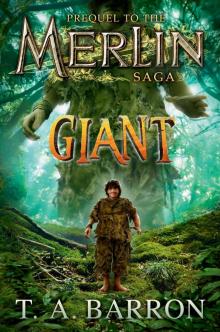 Giant
Giant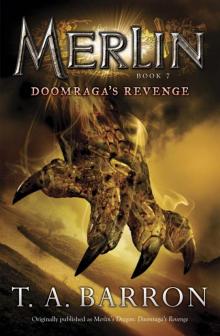 Doomraga's Revenge
Doomraga's Revenge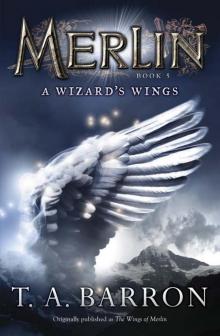 A Wizard's Wings
A Wizard's Wings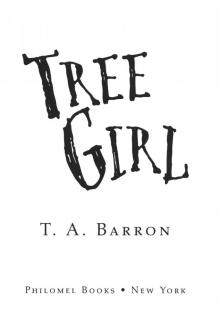 Tree Girl
Tree Girl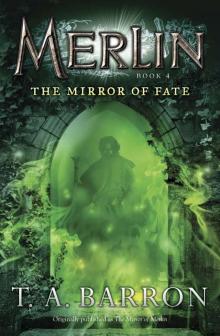 The Mirror of Fate
The Mirror of Fate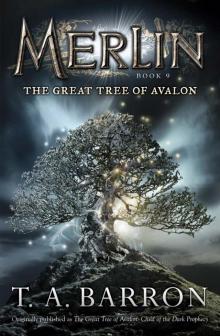 The Great Tree of Avalon
The Great Tree of Avalon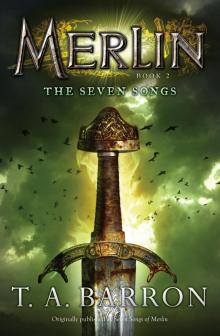 The Seven Songs
The Seven Songs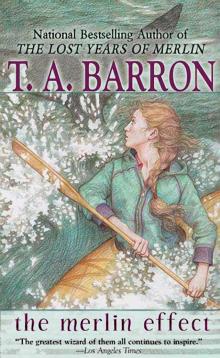 The Merlin Effect
The Merlin Effect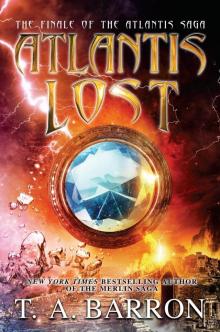 Atlantis Lost
Atlantis Lost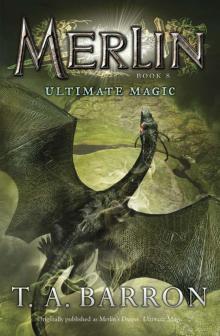 Ultimate Magic
Ultimate Magic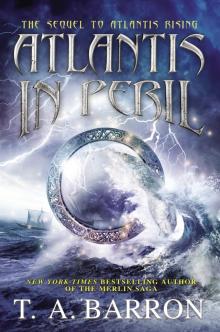 Atlantis in Peril
Atlantis in Peril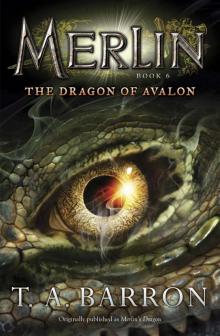 The Dragon of Avalon
The Dragon of Avalon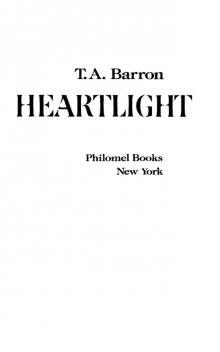 Heartlight
Heartlight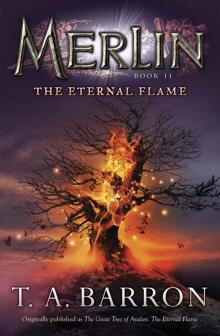 The Eternal Flame
The Eternal Flame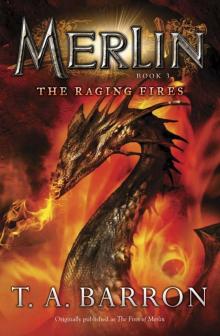 The Raging Fires
The Raging Fires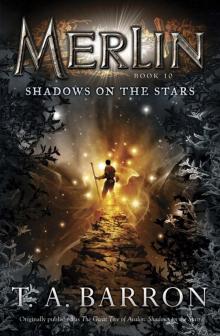 Shadows on the Stars
Shadows on the Stars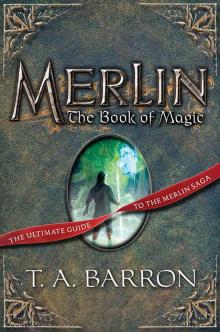 Merlin: The Book of Magic
Merlin: The Book of Magic The Lost Years
The Lost Years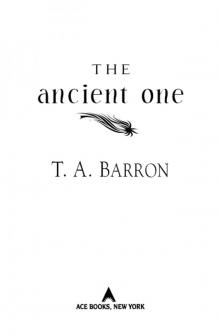 The Ancient One
The Ancient One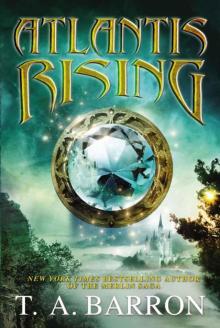 Atlantis Rising
Atlantis Rising